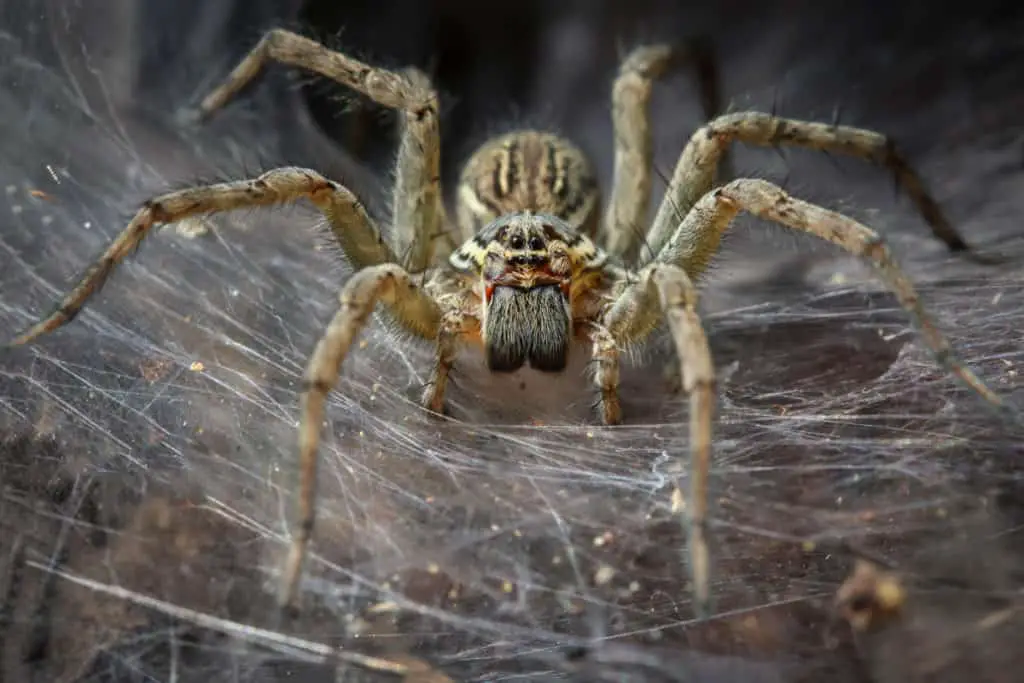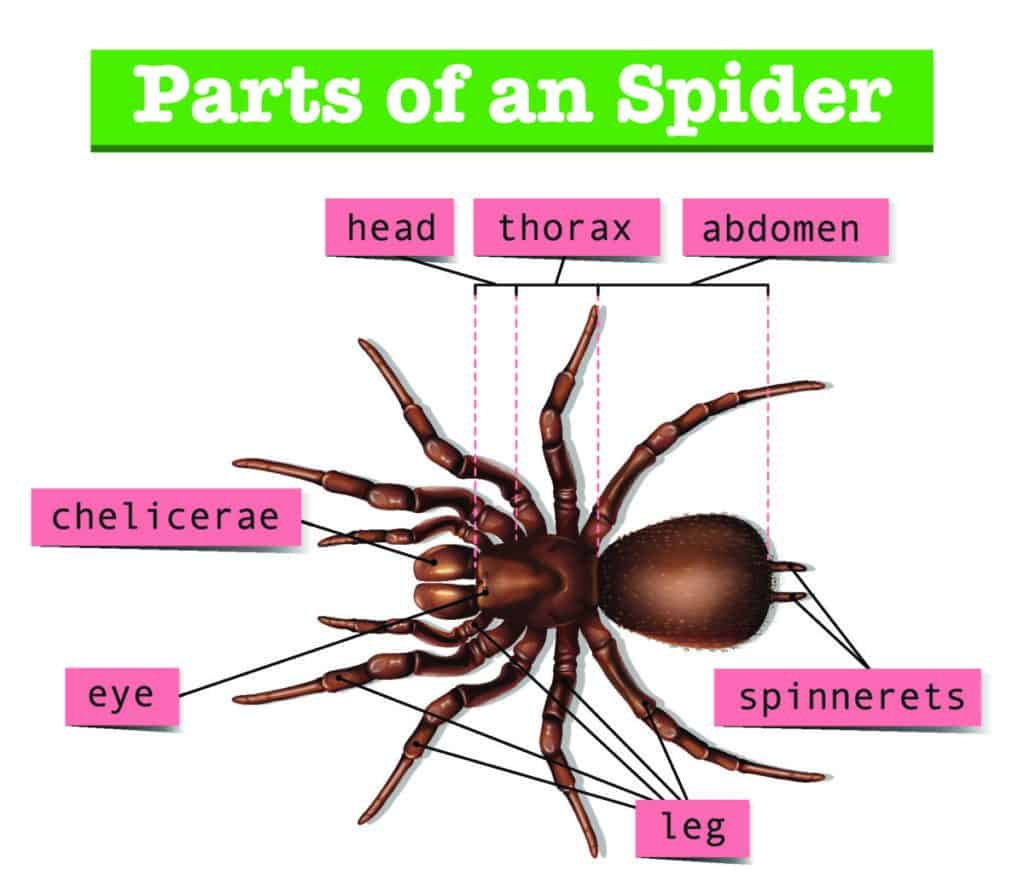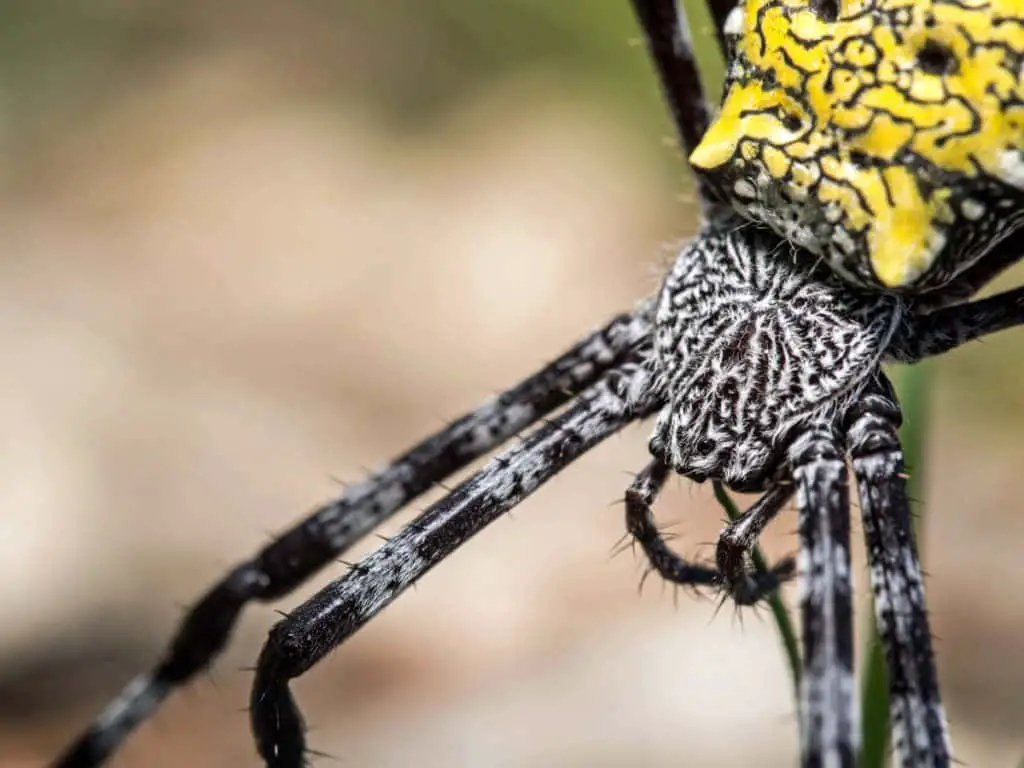Spiders are wonderfully fascinating creatures and everything about them causes a lot of curiosity, which in turn results in several questions about them.
One of these questions is do spiders have a nose?
No, spiders don’t have a nose, not like us anyway. We have noses, spiders have a network of hollow hair-like structures on their legs. These hairs break down the chemical composition of a scent. This helps spiders recognize the scent as prey or predator.

In this article, we take a closer look at the anatomy of the spider and more specifically how spiders are able to sense smell without a nose as we know them.
Anatomy Of The Spider
Spiders are generally well known for their appearance but there is more to them than just eight legs and eight eyes.
While most insects have three body parts – the head, thorax, and abdomen – spiders only have two main body parts which are the prosoma and the abdomen. These two body parts are then connected by a short narrow stalk called the pedicel.

Being able to distinguish the different body parts allows for the easy identification of spiders from other arthropods and insects.
For instance, the daddy long legs arachnid only has one body part, the abdomen. Despite this they often get confused for spiders by most people – they are arachnids but they are however not necessarily considered to be spiders.
The prosoma houses the spider’s eyes and jaws and unlike other insects, there is no separate head on the spider. Despite having eyes, jaws, etc, spiders do not have a nose as you might expect. This raises several questions, such as how does a spider smells, and we explore this further below.
So How Do Spiders Smell?
We have already established that spiders lack a nose, in the traditional sense at least, which begs the question of how they manage to discern certain smells one from another. After all, the sense of smell is one of your most important assets when you’re a creature out in the wild.
Arthropods, such as spiders, are amongst the only invertebrates that have an actual sense of smell, otherwise known as an olfactory system. This sense of smell has nothing to do with noses and when it comes to spiders they rely on multi-porous structures around their bodies that appear like small hairs.
So basically speaking, spiders smell by touching things with their limbs. The specialized hairs along their legs allow them to ‘smell’ objects by breaking down the chemical composition of that particular scent.
The special hairs also allow spiders to identify potential prey in the form of insects and also allow them to identify other spiders. Spiders also use these hairs to tell whether the items caught in their webs are edible or not.
Also, this means that when a spider crawls on you it can smell you because these sensory hairs will be making contact with your skin.
Some other common questions we have had are around both ends of the spider are Do spiders have a tongue? and Do spiders poop? Both logical questions we have written article on.
How Sensitive Is A Spider’s Sense Of Smell?
A spider’s sense of smell is quite strong, even without a nose to take in all the different scents. Their strong sensory system can be attributed to the cuticular hairs that are found on the spider’s limbs.
Some spiders, such as the cupiennius, otherwise known as the banana spider, have up to 100 thousand hairs on their exoskeleton.

A spider’s sense of smell is also crucial for breeding purposes. Spiders tend to rely on their sense of smell to find potential mates; females generally remain in their habitats and secrete a scent, which like a fine perfume attracts the male spiders. The males venture out to follow the scent until they have found a suitable mate.
Some types of spiders also give off a territorial scent that acts as a warning towards other spiders. This acts as a deterrent to other spiders who venture into their habitat.
As such, an acute sense of smell goes a long way in helping spiders avoid unnecessary conflict amongst one another and protecting themselves from potential attacks.
How Do Spiders Breathe?
As we’ve already established spiders do not have a nose and that raises another question; how exactly do they breathe if they don’t have a nose?
Tracheas
In mammals, we tend to breathe in oxygen via our lungs, oxygen that we breathe in through our mouth and nose of which spiders lack the latter.
Instead. spiders utilize other organs due to how their anatomy is structured. Spiders have a slit above their spinners which can be opened and closed. These slits contain tubes called tracheas which run from the slit into the body.
Book Lungs
Spiders also have what is referred to as book lungs. These are essentially hollow structures, that bear some resemblance to leaves, that allow for the flow of blood in the spider.
The book lungs hang in a gaping space that is connected to a tube, the opposite end of the tube is in open contact with the air and this is located below the spider’s abdomen.
Depending on the species, spiders will have one or two book lungs.
An interesting fact is that while modern spiders have developed tracheas and also possess one pair of book lungs, primitive spiders only have two pairs of book lungs and no tracheas.
Modern spiders use both systems simultaneously which gives them an advantage over primitive spiders in terms of utilization of oxygen as well as their general reaction time and speed.
You might think reading this that spiders would drown if they ended up in a puddle or being washed away by a rainstorm. You will probably be surprised to know that there some spiders that a very well adapted to the water. Check them out if you are interested, Can Spiders Swim? Let’s See Who Can and Who Can’t.
The Wrap Up
No nose? No problem! As we’ve established the lack of a nose does not hinder the spider’s ability to pick up on various scents for its general wellbeing and survival.
Despite having eight eyes, spiders generally have poor eye-sight, in relativity to other creatures like humans, so they rely heavily on their keen sense of smell thanks to the hair cuticles located along with their limbs.
We’ve also established they do not need a nose to breathe thanks to their book lungs and trachea systems that run throughout their bodies.
Sources
https://www.sophisticatededge.com/can-spiders-smell.html
https://www.journals.uchicago.edu/doi/pdf/10.1086/278464
http://www.scholarpedia.org/article/A_spider%27s_tactile_hairs
http://learning.si.edu/educators/lesson_plans/under_spell_spiders/spiderspecifics.html
https://www.spidersworlds.com/spider-senses/
https://ednieuw.home.xs4all.nl/Spiders/InfoNed/sensoryleg.html
